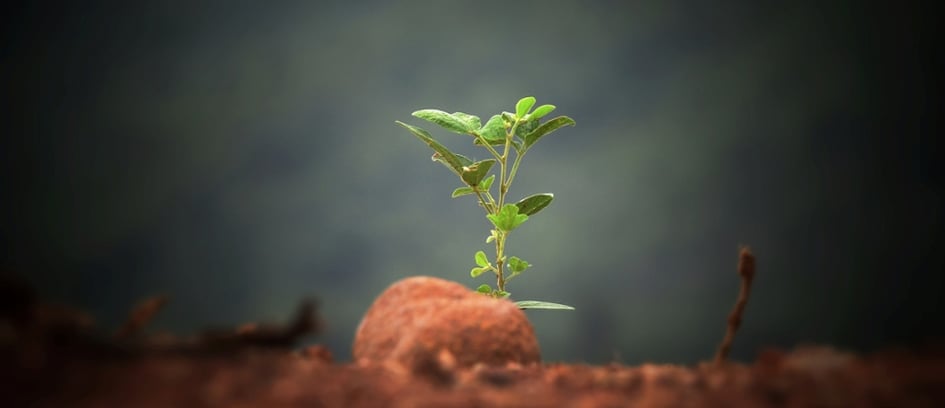Life among the ruins
Rev. Dee McIntosh, chaplain | May 2, 2020
In 2005, when I was a sophomore in college, I picked up a Time magazine about Hurricane Katrina news coverage. While Katrina wasn’t the biggest hurricane to touch down in Florida, it is known for the destruction and damage it caused in New Orleans, remaining the deadliest hurricane to hit the United States and resulting in 1,836 deaths. “Life among the ruins” is from an article in the September 2005 edition of Time, focusing on the brutal task of the remaining New Orleans residents. In the midst of flooding, sewage, and wreckage, they determined to find every corpse they could so families could have closure. This story of resiliency, empathy, and human decency remains with me. In 2008, I took my crumpled magazine, cut out and framed the article title, and put it in my office as a perpetual reminder.
 Ezekiel 37 is the infamous “dry bones” passage, where God takes the prophet Ezekiel to the edge of a valley, like the valley of the shadow of death in Psalm 23. The valley is filled with dry, brittle bones, metaphorically referring to the hopelessness felt by God’s people. “Our bones have dried up,” they declared from exile. Everything symbolically representing their faith and its importance was destroyed. The temple and Davidic monarchy were gone, and people were no longer attached to their land. So, they poured out their pain. In their cries for deliverance, God takes Ezekiel where King David once proclaimed, “Ye though I walk through the valley of the shadow of death, I will fear no evil, for thou are with me” (Psalm 23). Similar to men and women in New Orleans, Ezekiel found himself before a valley of dry bones, standing beside the God of mercy, compassion, and grace.
Ezekiel 37 is the infamous “dry bones” passage, where God takes the prophet Ezekiel to the edge of a valley, like the valley of the shadow of death in Psalm 23. The valley is filled with dry, brittle bones, metaphorically referring to the hopelessness felt by God’s people. “Our bones have dried up,” they declared from exile. Everything symbolically representing their faith and its importance was destroyed. The temple and Davidic monarchy were gone, and people were no longer attached to their land. So, they poured out their pain. In their cries for deliverance, God takes Ezekiel where King David once proclaimed, “Ye though I walk through the valley of the shadow of death, I will fear no evil, for thou are with me” (Psalm 23). Similar to men and women in New Orleans, Ezekiel found himself before a valley of dry bones, standing beside the God of mercy, compassion, and grace.
The aftermath of Katrina is long gone. New Orleans rebuilt, and we moved on as a nation. However, we face other valleys, communal or personal, within our families and nation. Perhaps we hide them from others when we feel the brittleness and dryness of our bones. Sometimes helplessness is in the midst of hopelessness, combining into one valley of dust and death. Imagine hearing the Lord ask, as he did Ezekiel, “Can these bones live?”
Ezekiel, knowing he couldn’t make the bones live, speaks in faith. “O Lord Gᴏᴅ, you know,” he says. God brings Ezekiel into the miracle of resurrection by telling him to do what he can’t: speak life. “Prophesy over these bones…hear the word of the Lord…Behold, I will cause breath to enter you, and you shall live. And I will lay sinews upon you, and will cause flesh to come upon you, and cover you with skin, and put breath in you, and you shall live, and you shall know I am the Lord.” Then Ezekiel hears creation happening from dust, bone rattling bone. Bodies but not yet life, no breath to animate their being. They are the shell of what was and the promise of what could be.
In this text, life returns only when “ruach” is breathed into bones. In the Old Testament, “ruach” means breath, spirit, and life. This breath of God is the life within us; the disciples are told to wait for this breath (Acts 1) so they’d receive power to proclaim the gospel into a world desperate for good new.
“Thus says the Lord God: Come from the four winds, O breath, and breathe on these slain, that they may live” (Ezekiel 37:9). God made them live, bringing life through speaking. As I reflect on the world today, I see a lot of dry bones and hopelessness. We could use this breath, the “ruach” in our individual lives, families, and world.
The Bible says, “Keep these words I have spoken forth to you today in your heart. Recite them to your children and talk about them when you are at home and when you are away, when you lie down and when you rise” (Deut. 6: 6-7). I often wonder if people in exile lost capacity to remember God’s promises, so focused on what they lost, what they could no longer do, or how the world changed that they forgot to recite the words of the living God. Remembering God’s promises in times of hopelessness is powerful. We remember Jesus declared, “I will never leave you nor forsake you, I am with you until the end of the age.” Psalm 23 is comforting: “Ye though I walk through the valley of the shadow of death, I will fear no evil, for thou are with me, thy rod and staff, they comfort me.”
Perhaps this is the time we open our Bibles and recite God’s words, for God has power to speak life. We are in this together. There is life among the ruins.